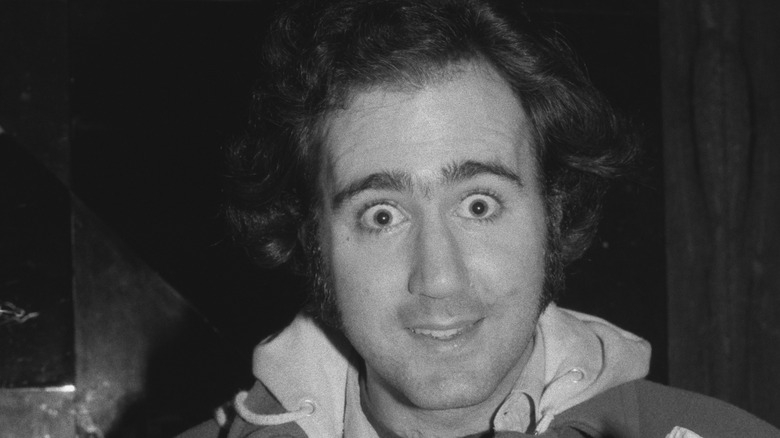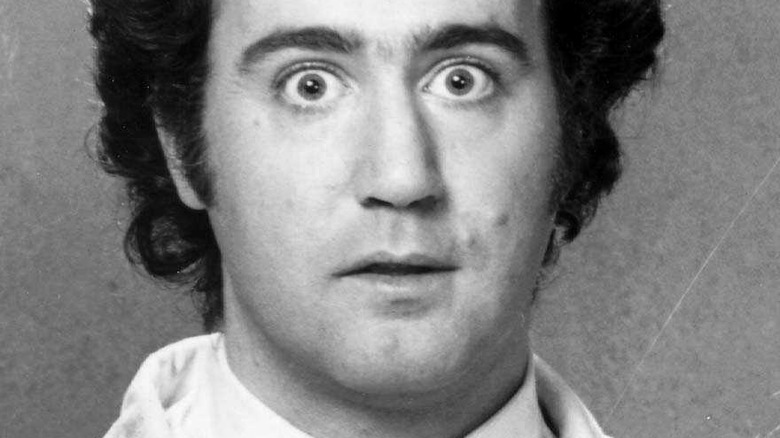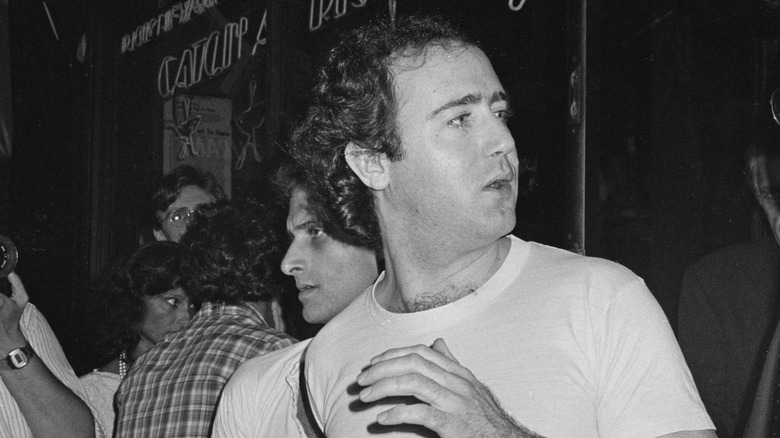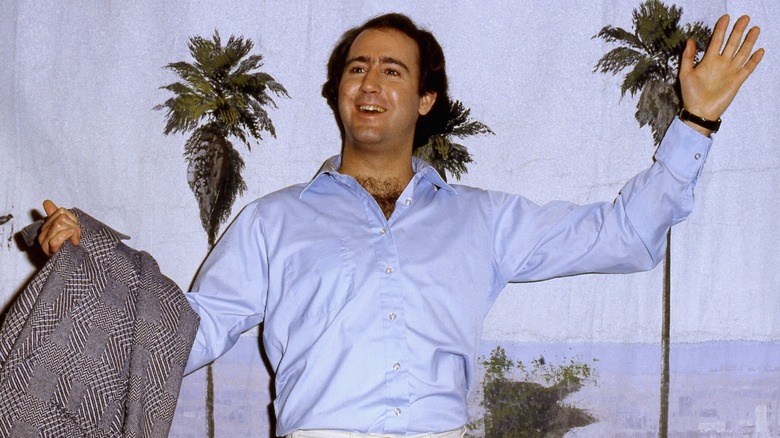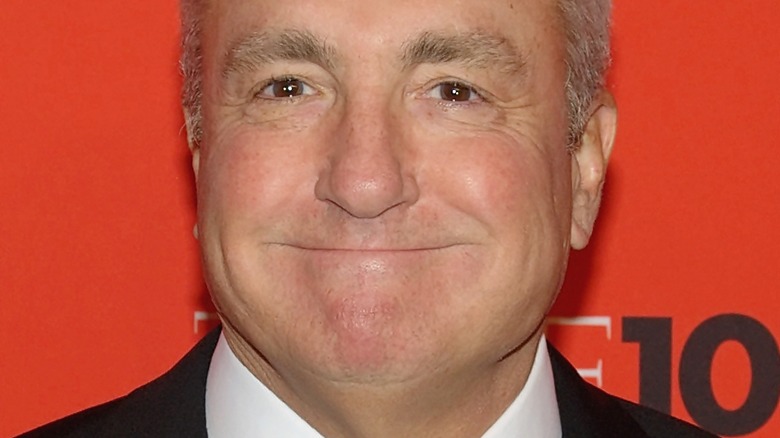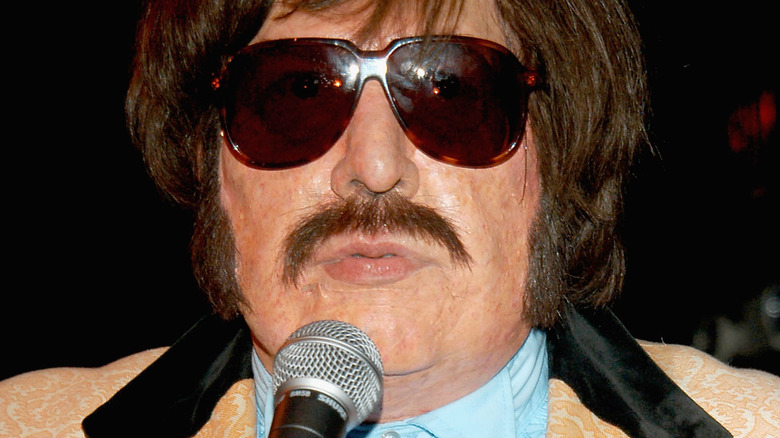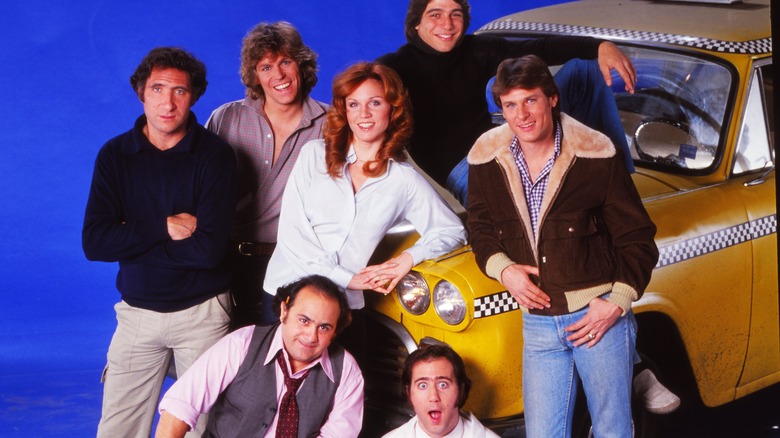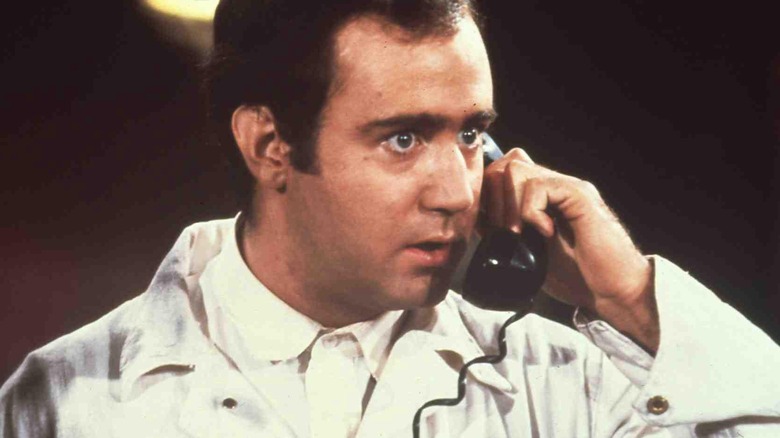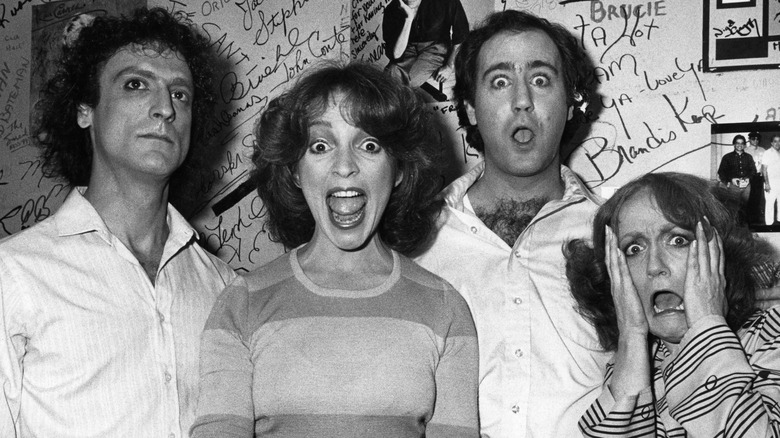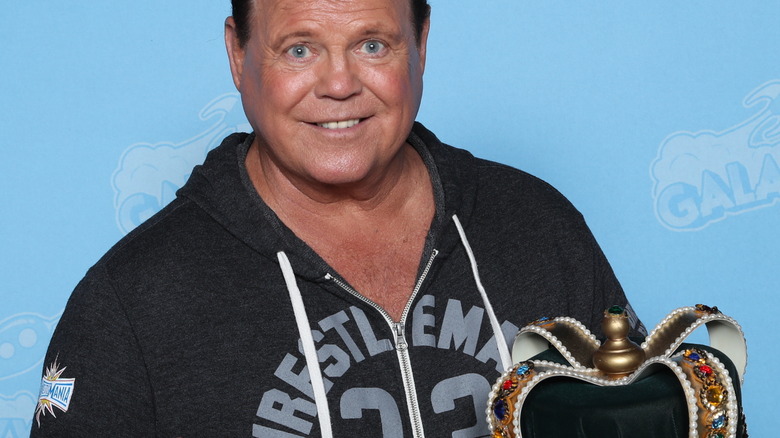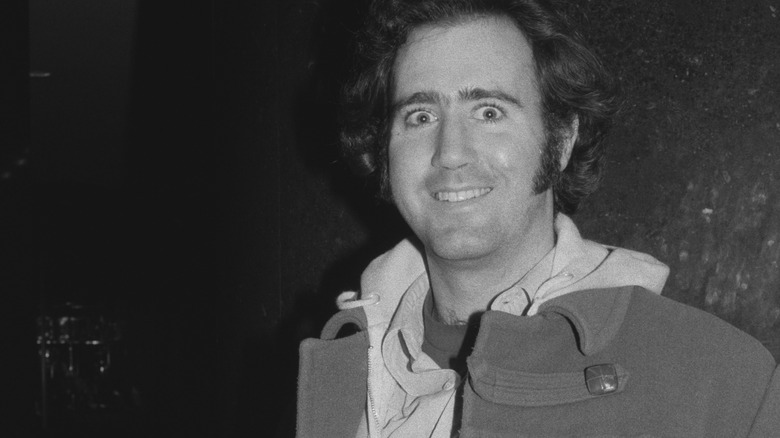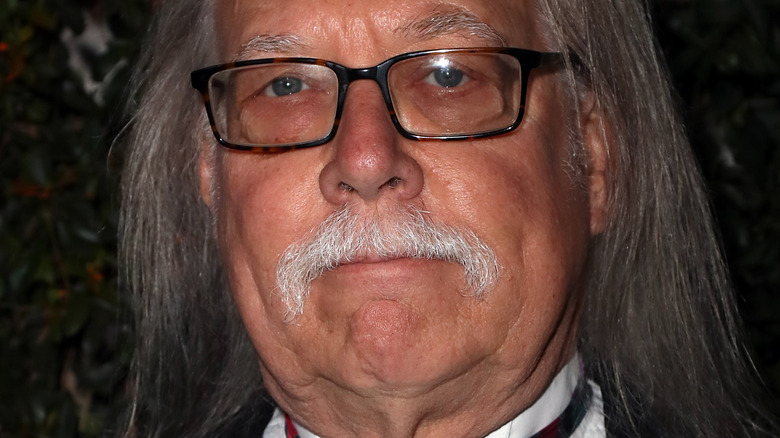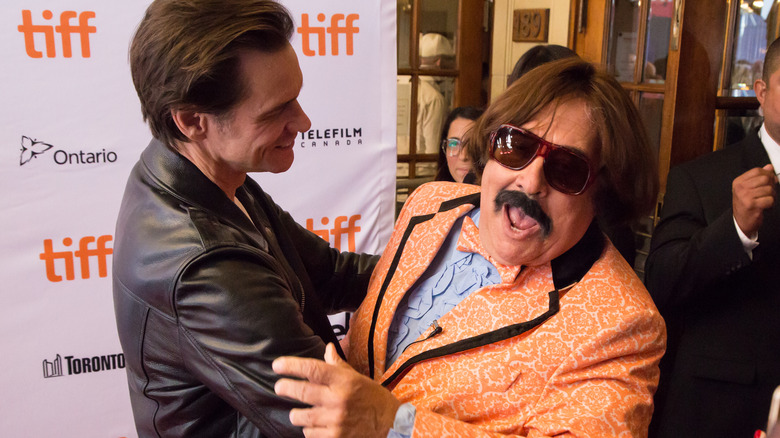The Untold Truth Of Andy Kaufman
In its list of greatest stand-up comics of all time, Rolling Stone ranks Andy Kaufman at No. 14, referring to him as a "legend" who utilized "audience-baiting" masterfully. Yet, to describe Kaufman as merely a stand-up comic leaves out much of what made him so special and unique as a performer. The genius of Andy Kaufman, as written in The New Yorker, was partially the mystery surrounding how he became Andy Kaufman, the performer, a man who didn't want to be called a comedian, but wouldn't have minded being compared to Charlie Chaplin.
Kaufman was a complicated and sometimes perplexing figure, constantly pushing boundaries and challenging audiences (and even colleagues) in the comedy world, seemingly unconcerned as to whether people were in on the joke or not. As described by The Guardian, Kaufman wanted audiences to perceive what they were witnessing as a disaster, but what he was really attempting to do was to "perform inside the audience's mind."
In 1982, an interviewer with the New York Daily News said talking to Kaufman made one feel "a little nuts" and that he "walks on the wild side, on a thin edge between reality and fantasy" (via The Day). The uniqueness of this approach, and his success at doing it, is what has cemented Andy Kaufman as one of the all-time greats in comedy and performance art. "Andy Kaufman had guts," read an obituary in The Boston Phoenix, following Kaufman's death in May of 1984.
As James Greenberg, onetime film critic for Los Angeles magazine, once put it: "Love him or not, there's never been a performer quite like Andy Kaufman."
He began performing as a child
Andrew "Andy" Kaufman was born on January 17, 1949, in New York City, New York (via Britannica). Per Biography, his parents, Stanley and Janice, raised Kaufman and his two younger siblings in the Great Neck region of Long Island. There, a young Andy demonstrated his creativity early on by creating and performing pretend television shows in the Kaufman house and by putting on entertaining performances at birthday parties and for his two siblings by the time he was 8 years old.
In Bill Zehme's biography "Lost in the Funhouse: The Life and Mind of Andy Kaufman," the author recounts how Kaufman said he truly believed there was a camera in the wall and that millions of people were watching him while putting on these performances. He would put on performances at recess for his friends, everything from horror to adventure to musicals (per New York Magazine).
According to AndyKaufman.com, his mother recognized his creativity and love of music from a young age, and she often played music around the house so that he could dance. He also purchased and began playing conga drums at a young age (an instrument which would later become part of many of his acts) after witnessing Nigerian drummer Babatunde Olatunji perform with them, eventually even receiving lessons from the famed drummer himself, as reported by Salon.
He wasn't a great student in high school
While he was exceptionally creative from a young age, young Andy Kaufman had difficulty following the structured days of his public schooling and nearly failed classes on numerous occasions. In Phil Berger's "The Last Laugh," the author describes how Kaufman was advanced beyond his peers in many ways, but was mostly indifferent to his school studies, instead prioritizing his own personal interests such as writing and poetry (via Deadspin).
According to AndyKaufman.com, along with having little interest in school, Kaufman also had no interest in sports — although he demonstrated athletic ability — and spent most of his free time focused on his writing, performing his poetry, playing his conga drums, and working on his impressions (particularly of Elvis Presley).
As his mother put it, Andy Kaufman was the "problem child" of the three Kaufman siblings, and even though he had seen psychologists and psychiatrists from a young age, his mother told Rolling Stone she believed it was all an act — even back then (via The Daily Beast). Despite his disinterest in his studies, Kaufman still managed to graduate in 1967, in the midst of the Vietnam War; he received a deferment from the military draft after failing the psychological test (per Biography).
He made a campus television program while in college
Despite not excelling academically in high school, Andy Kaufman enrolled in a Boston junior college in 1968 after taking a year off following graduation. As described by AndyKaufman.com, he was a television and radio production major and even created a popular campus TV program called "Uncle Andy's Funhouse." In "Politics and the American Television Comedy: A Critical Survey," author Doyle Greene described how in the show, Kaufman would lead sing-a-longs with the audience, play his congas, and tell wild and entertaining stories.
According to Kaufman's friend Bob Zmuda, Kaufman would put on many of the exact same performances for his audience as he used to do for his friends growing up, and he received very positive reception from his college peers, which energized him to continue (per "Andy Kaufman Revealed!: Best Friend Tells All").
He also had quite a few other important events during these college years. For one, he was introduced to transcendental meditation, and he began to meditate twice a day, something he would practice for the rest of his years (per AndyKaufman.com). Secondly, he traveled to Las Vegas to meet one of his idols: Elvis Presley. Both of these had a profound impact on the college-aged Kaufman.
He began doing stand-up in character
After earning his degree, Andy Kaufman left Boston and returned to New York City, where he would begin doing stand-up comedy (per Britannica). Despite performing stand-up, particularly in the beginning at New York City's The Improv Comedy Club, Kaufman often insisted throughout his career that he was not a comedian. During these early sets, he often experimented with characters and used a variety of different voices.
Budd Friedman, legendary owner of The Improv, took Kaufman under his wing and supported his acts which often confused audiences. In Friedman's autobiography "The Improv: An Oral History of the Comedy Club That Revolutionized Stand-up," he recalled that the first time Kaufman played at the club, he was actually frustrated and angry by the performance — before he began to understand it (via Paste Magazine). Kaufman was, according to Friedman, an "enigmatic provocateur," who "blurred the line between imagination and insanity almost beyond recognition."
As told by Biography, Kaufman once simply read from F. Scott Fitzgerald's "The Great Gatsby" on stage, while another time, he brought out a sleeping bag and took a nap in front of the audience. Despite sometimes leaving his audiences befuddled with his performance art, he started to build a following, and soon he had representation by George Shapiro, the same manager who represented Carl Reiner and Dick Van Dyke.
In Phil Berger's "The Last Laugh," Berger explains how Kaufman also began to utilize characters that he would later become very well-known for, such as Foreign Man and Tony Clifton (via Deadspin). During this time, he also met Bob Zmuda, who would become his closest friend (per AndyKaufman.com).
He was a 'Saturday Night Live' original
It didn't take long for Andy Kaufman to go from a small stage to a much bigger one: a new show being broadcast nationally live on NBC called "Saturday Night Live." According to author Bill Zehme, "SNL" creator Lorne Michaels hadn't known about Kaufman when somebody suggested him for the show, so he went and watched him perform once ... and then another 10 or more times because he was simply "mesmerized" by him (per "Lost in the Funhouse: The Life and Mind of Andy Kaufman").
On the very first episode of "Saturday Night Live," hosted by George Carlin on October 11, 1975, Kaufman did his famous lip-synched Mighty Mouse skit, which both confused and delighted the audience. In "Politics and the American Television Comedy: A Critical Survey," Doyle Greene said it was one of the most talked about parts of the show over the next week.
According to Biography, Kaufman made 14 total appearances on "Saturday Night Live," with characters that were often controversial or boundary-pushing in nature, and while he was gaining quite a cult following, not everybody loved or understood him. Kaufman was eventually "banned" from "SNL," after viewers voted in November 1982 to no longer allow him on the show. According to Far Out Magazine, the audience poll on Kaufman's "SNL" fate was meant to be a "cheap joke," but, in fact, Kaufman was allegedly upset by the results (as were some castmates) and he never did appear on the show again.
His Tony Clifton character was purposely meant to confuse people
One of Andy Kaufman's most infamous characters was Tony Clifton, a loud-mouthed longue singer purposely meant to confuse and irritate people. Beginning in 1977, he had The Comedy Store "hire" Clifton to be his opener (per AndyKaufman.com). In "Was This Man a Genius?: Talks with Andy Kaufman," writer Julie Hecht recalled how once, when Kaufman came out on stage as Clifton, the crowd seemed to be in on the joke that Clifton was actually Kaufman, as Kaufman as Clifton would troll the audience by smoking up on stage in the smoke-free lounge while singing bad renditions of Frank Sinatra songs. He'd also insult everyone in his path (per Los Angeles magazine).
Sometimes Kaufman would have other people perform as Tony Clifton, making it even more confusing. According to The New York Times, Kaufman would even deliberately confuse his colleagues. Once when John Belushi told him how much he liked the Clifton character, Kaufman stated that he had retired the act. When Belushi responded that he had just seen him do his Clifton character, Kaufman responded that Belushi had seen the real Clifton (of which there, of course, wasn't really one).
In 1982, on "Late Night with David Letterman," Clifton appeared on the show and Letterman pointed out that many people believed he was Andy Kaufman. "Kaufman's been using my name to get places," Clifton declared, except it's now known that this appearance wasn't Kaufman as Clifton, but his friend, adding to the deliberate confusion. When Kaufman was offered a role on the sitcom "Taxi," Kaufman agreed, but only under one condition: They had to hire Clifton for two episodes (per AndyKaufman.com).
He took the role on 'Taxi' to help pay for his other endeavors
According to Rolling Stone, despite being an "unlikely idea for a hit," the ABC sitcom "Taxi" turned into one of the greatest television shows of all time. On the show, Andy Kaufman played Latka Gravas, a version of his Foreign Man character. As explained by Biography, Kaufman's "erratic reputation" was already well-known by producers when hired ... and it's not entirely clear who was and was not in on the gag regarding the hiring and subsequent firing of Kaufman's Tony Clifton character on the show. According to Kaufman himself while talking to The Associated Press, Clifton was just a guy who Kaufman felt sorry for and he was just trying to help him out (via Lakeland Ledger).
Still, for some artists (and comedians, in particular) it can be seen as selling out to join a mainstream television sitcom. While Kaufman wasn't necessarily fond of the show, he didn't feel this way about his time on "Taxi." When asked directly in an interview if he was selling out his creativity, Kaufman rejected the idea. "No," he said, according to "Was This Man a Genius?: Talks with Andy Kaufman," "because the money I make on the show I put into my concerts." He stressed that he didn't care about becoming a star like Steve Martin, only that his manager told him that with more fame and recognition, he would have more freedom to do his own creative endeavors. It was, according to Kaufman, a "lowbrow evil [that was] necessary" (per The New York Times).
His Carnegie Hall show is legendary
Andy Kaufman's increased visibility and fame paid off. In 1979, he performed his legendary show at Carnegie Hall. Even before his show, Kaufman was already up to his antics. As described by Bob Zmuda in "Andy Kaufman Revealed!: Best Friend Tells," days before Kaufman's scheduled show, a "deranged" man was outside of Carnegie Hall shouting at ticket-buyers that Andy Kaufman was the antichrist. That man, according to Zmuda, was Kaufman in disguise (and done without the knowledge of management).
The show itself was no less bizarre. On stage, in front of an audience of 2,800, Kaufman opened with his Tony Clifton character. He did his Elvis impersonation and wrestled a woman (per AndyKaufman.com). He invited his grandmother up on stage, only to reveal at the end of the show that it was actually fellow comedian Robin Williams (per Far Out Magazine).
In its review of the event, The New York Times described Kaufman's comedy act as an "oddball ... variety show" that ended with a mostly (but not entirely) receptive audience ... only to have Kaufman invite them all onto 24 charter buses to go out for milk and cookies and watch a circus show of Kaufman's creation. "I'm not a comedian," he told New York Magazine in 1979, saying he was a song-and-dance man instead. "The audience is merely witnessing what I've done in my room all my life."
His brought his antics to numerous television shows
Instead of leveraging his fame for more mainstream opportunities, Andy Kaufman continued to push boundaries and deliberately alienate his audiences. For instance, in 1981, Kaufman was set to appear on ABC's "Fridays," the network's rival show to NBC's "Saturday Night Live," alongside comedians like Larry David and Michael Richards.
During the live taping, Kaufman seemed to break character during a sketch, calling the skit stupid, and ended up in a fistfight with the script supervisor who had jumped onto the stage and yelled to cut to a commercial (per The New York Times). It was later confirmed by ABC to have been staged, but many were unsure — including some from the show who hadn't been informed of what they had planned. It was "kamikaze comedy" meant to boost ratings, according to one cast member who had known it was going to happen (per Aish).
As described by Britannica, Kaufman also did many "bizarre" talk-show appearances, as well as two films. In "Heartbeeps," which bombed at the box office, Kaufman played a robot who fell in love with another robot. Kaufman defended the film to The Associated Press, saying that he cried every time he read the script and he wasn't much of a crier (via Lakeland Ledger).
His professional wrestling stint was staged
While perhaps not surprising with hindsight, when Andy Kaufman began to wrestle — often against women — many believed it was a real attempt at the sport (a lifelong interest of Kaufman's, after all); it wasn't revealed to be a long-term, elaborate prank until a decade after his death. In 1979, The Associated Press reported on one of these wrestling matches, where Kaufman wrestled and defeated a 26-year-old gym teacher named Diana Peckham, making misogynist comments, such as women belonging in the kitchen (via Bangor Daily News).
In 1982, in a long-ranging interview where he cycled through nearly all his characters, Kaufman told a reporter that women could peel potatoes and take care of babies, but not wrestle (per Boca Raton News). After getting a lot of flack for his misogynistic comments and wrestling women, Kaufman would — in character — challenge the top male wrestlers across the country (via The Boston Phoenix).
By 1980, Kaufman was wrestling numerous matches a year, many with the Continental Wrestling Association (per AndyKaufman.com). In 1982, The New York Times reported on a "feud" between Kaufman and professional wrestler Jerry Lawler, which ended up with the two getting into a planned fistfight on the set of "Late Night with David Letterman," again leaving audiences confused as to if it was real or a prank. Years later in 2010, Lawler will recall the pretend feud between the two, saying it provided him with unique fame that often didn't come to professional wrestlers at the time (per Bleacher Report).
Many thought his cancer diagnosis was a prank
Despite living a relatively healthy life and never smoking, Andy Kaufman was diagnosed with lung cancer in January 1984, which some assumed was another Kaufman prank (per Biography). Sadly, he died only a few months later in Los Angeles at age 35. Despite ongoing theories that Kaufman had conspired with friends and would eventually re-emerge, many close to him continuously confirmed his death.
At age 90, Kaufman's father told the media that he had "no doubts" that his son had died and that he was proud of his accomplishments. "At the time, it was scary," he said, per CNN. "I used to be embarrassed by my son. But he knew everything that he did, everything was deliberate, everything was calculated." Kaufman's brother and girlfriend were also with him when he died in the hospital and confirmed they were there at his end, according to TMZ.
Perhaps one reason these theories have continued to persevere is due to Kaufman's good friend Bob Zmuda, who despite no evidence, has stressed publicly that he believes Kaufman faked his death — for which Zmuda has received a significant amount of criticism (per The A.V. Club). A hoax also went around the internet at one point that Andy Kaufman had reemerged (via PC Magazine). Regardless, the official death certificate for Kaufman has also been made available, confirming the date and cause of his death.
He had one daughter with his high school sweetheart
Years after his death, it was revealed that Andy Kaufman, who never married, had a daughter. In the 1990s, a woman named Maria Colonna discovered that her biological father was Andy Kaufman, who along with his high school girlfriend put her up for adoption in 1969 when he was only 17 years old, according to Biography. It is a fact that he kept close to his chest during his life, only once discussing it with his friend Bob Zmuda (per "Andy Kaufman Revealed!: Best Friend Tells All").
"I wonder sometimes to myself, how different would it have been if I had grown up with my biological father?" Colonna asked on the documentary podcast "Knowing Andy Kaufman" in 2021. Despite never knowing him, Colonna has since become close to her extended family on the Kaufman side. Before his death in 2013, Andy's father Stanley said he had reunited with Maria after she discovered her lineage and that they had become extremely close, saying Maria was the greatest gift his son, Andy Kaufman, had given him (per CNN).
His legacy lives on today
In the decades since his death, Andy Kaufman has continued to grow in renown. As described by The Associated Press, Kaufman had a "naked eagerness to be loathed" and was a "subversive, multilayered put-on artist," whose straight side didn't exist (via The Boston Phoenix). Comedic legend Carl Reiner called Kaufman brilliant in 1982, saying that nobody could "see past the edges [of Kaufman], where the character begins and he ends" (per Boca Raton News).
In 1995, a tribute to Kaufman aired on NBC titled "A Comedy Tribute to Andy Kaufman" (per Biography). In 1999, Jim Carrey starred in the critically acclaimed biopic "Man on the Moon," which brought Kaufman's antics to an entirely new generation (and a performance by Carrey that The New York Times described as "flawless" and "uncanny"). He was also the subject of the popular 1992 R.E.M. song "Man on the Moon," which reached No. 30 on the Billboard Hot 100.
Kaufman's estate has also created The Andy Kaufman Award, which rates "originality, creativity, spirit and execution" by comedic performers who are pushing boundaries in comedy. Past winners have included comedians Kristen Schaal, Reggie Watts, Nick Vatterott, Harrison Greenbaum, Harry Terjanian, Marcus Monroe, Brent Weinbach, Blaine Kneece, and Dru Johnson (per AndyKaufman.com).
